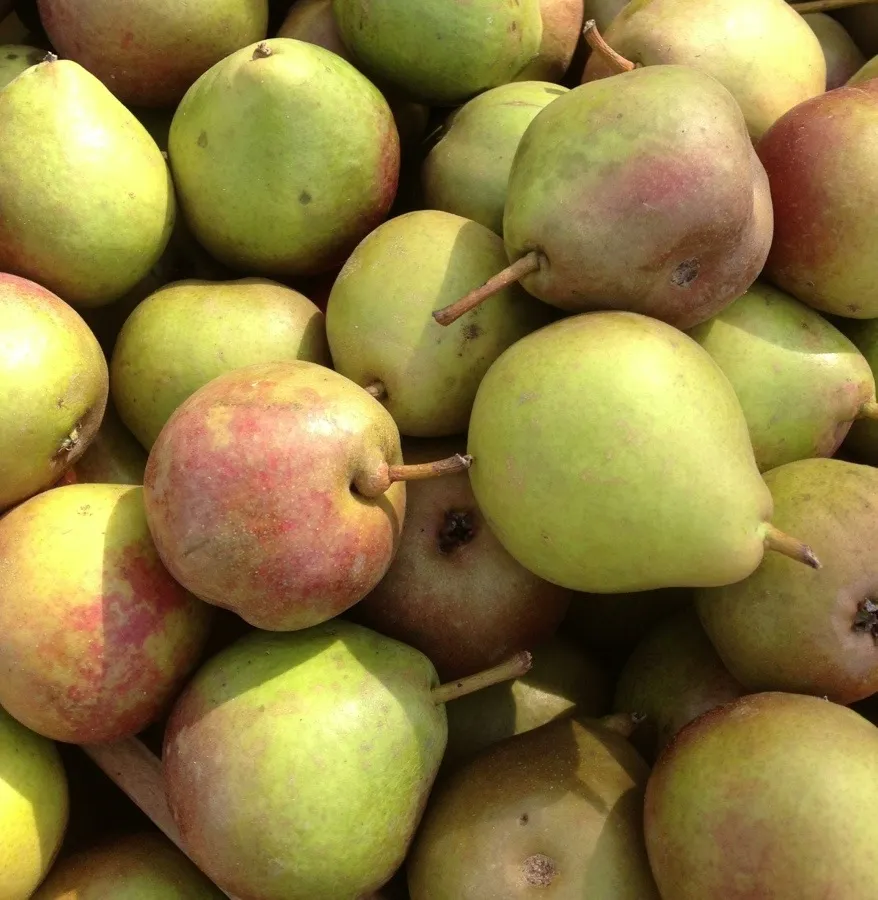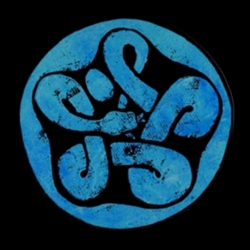
One sunny autumn afternoon the devil was walking home through the forest with a leisurely gait. He’d just been to a wedding, where he feasted until he could eat no more, and also partook of the wine to the best of his ability. Glancing around, he whistled a little tune, and then, right next to the path, he noticed a small heap of wild pears. He laughted out loud and opened the front of his pants, saying to himself: “Oh, wild pears! What’s the use?”, and with a joyful sigh he pissed on the fruit.
A week later fine drizzle, cold wind and distant thunder found the devil in the forest one again. He held his collar together with one hand and kept his threadbare cap on his head with the other as he scurried along, panting a little. He had not eaten in days and his belly was aching with hunger.
Suddenly, he noticed the heap of wild pears. He stopped, looking at the fruit on the ground thoughtfully, then he squatted down and picked a pear from the top of the heap. “No piss on here!”, he pronounced, and devoured it in two bites. Then he picked up a second one… “No piss on here, either!”, he said, and ate that one, too. He picked up a third pear: “No piss on here, either!”
He kept on squatting there until he had eaten all the wild pears. Then he gave a sigh and a groan as he raised himself up again, and hurried on.
*
I heard this story as a child, and it has kept coming to mind ever since. Sometimes I also tell it. Like right now.
What is this story about?
For me, firstly, it is about life: the inevitable ups and downs. It’s not all beer and skittles. Unpredictable changes can happen at any time, and if you disrespect the little things, you don’t deserve the great ones… if you believe that you are secure, that very belief puts you in danger.
Secondly, though, and it seems to be the deeper meaning, it is about the splitting type of pseudo-personality. About the kind of person for whom everything (and everyone) is either perfect or totally rubbish. The only trouble with that is that nobody and nothing is ever fully perfect, or bad to the core. So this kind of person is eternally disappointed: they cannot have what they want, as it doesn’t and cannot exist.
Perhaps the story could be entitled The Hungry Demon and the Wild Pears.
But who had gathered the wild pears into a heap?
//
Egy napos őszi délutánon az ördög hazafelé baktatott az erdőben. Lakodalomból érkezett, ahol alaposan telezabálta magát, és jócskán ivott a borból is. Nézelődött, fütyörészett, majd az ösvény mellett észrevett egy kis kupac vadkörtét. Elröhögte magát, megoldotta a nadrágja elejét, és azt mondta magában: “hah, vadkörte, vackor, mit nekem az ilyesmi! Semmire se jó!”, azzal jólesően lepisálta a kupacot.
Egy héttel később aztán a szemerkélő eső, a hideg szél és a távolból hangzó mennydörgés megint az erdőben találta az ördögöt. Egyik kezével a kabátja gallérját fogta össze, a másikkal a foszlott kucsmát nyomta a fejéhez, úgy igyekezett, enyhén lihegve. Napok óta nem evett, csikarta a gyomrát az éhség.
Egyszercsak meglátta a kupac vadkörtét. Megállt, elgondolkodva nézte a gyümölcsöt a földön, aztán lekuporodott, és felvett egy körtét a kupac tetejéről. “Ez nem pisás!” állapította meg, és két harapásra végzett is vele. Aztán felvett egy másikat… “Ez se pisás!”, mondta, és megette azt is. Jött a harmadik: “Ez se pisás!”
Egészen addig kuporgott ott, amíg az összes vadkörtét meg nem ette. Aztán felsóhajtott, egy nyögéssel talpra állította magát, és elsietett.
*
Gyerekkoromban hallottam ezt a mesét, időnként azóta is eszembe jut, van, hogy én is elmesélem. Például most is.
Miről szól ez a történet?
Nekem, egyrészt, az életről szól: egyszer hopp, másszor kopp, addig nyújtózkodjál, ameddig a takaród ér, ki a kicsit nem becsüli, és így tovább. Kiszámíthatatlan kanyar akármikor jöhet, aki elhiszi, hogy biztonságban van, az éppen ezzel teszi ki magát a veszélynek.
Másrészt viszont, és ez tűnik a mélyebb értelemnek, a hasító típusú álszemélyiségről szól. Akinek minden (és mindenki) vagy tökéletes, vagy úgy szar, ahogy van. Amivel csak annyi a gond, hogy senki és semmi nem tud sem maradéktalanul tökéletes, sem minden ízében rossz lenni. Így aztán az ilyen ember újra és újra csalódik: soha nem kaphatja meg azt amire vágyik, mert az nincsen, és nem is lehet.
Talán az is lehetne a történet címe, hogy Az éhes démon és a vadkörte.
De ki rakta kupacba a vadkörtét?




